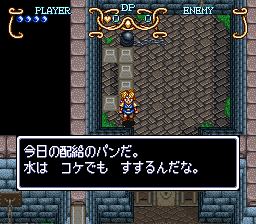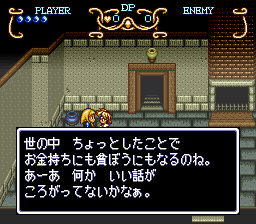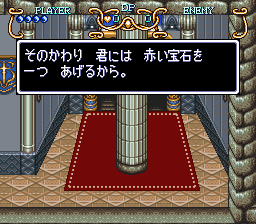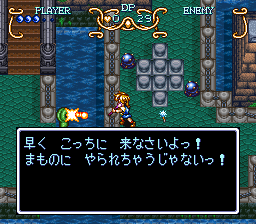Amusing mistranslations from Illusion of Gaia thread. Updated as I find them.
My favorite so far. A guard drops some crummy bread for you to eat. Original English:
"It’s today’s ration of bread.
Even moss drinks water."
The first sentence is right. The second sentence says "If you want water, suck on the moss or something."
That's a wee bit darker!
"It’s today’s ration of bread.
Even moss drinks water."
The first sentence is right. The second sentence says "If you want water, suck on the moss or something."
That's a wee bit darker!
The original translation is actually valid. *In isolation*, you could translate it that way. But context is key. A non sequitur about moss isn't what was intended.
The original translation has non sequiturs frequently. Any time you see one, you can guess it's a mistranslation.
The original translation has non sequiturs frequently. Any time you see one, you can guess it's a mistranslation.
Speaking of...
English: "It's the little things in life that make you rich or poor. Well, heard any good stories?"
Japanese: "The most trifling thing in the world can determine whether you’re rich or poor. Ahhh, I wish money grew on trees."
English: "It's the little things in life that make you rich or poor. Well, heard any good stories?"
Japanese: "The most trifling thing in the world can determine whether you’re rich or poor. Ahhh, I wish money grew on trees."
This one took me like an hour to totally understand. It's really no wonder things like this slip through. The translator had a deadline. They didn't have the luxury of spending an hour trying to understand what an unimportant villager was saying.
(If you were wondering, the original makes 4 mistakes.
ちょっとした doesn't mean "little". It means trifling/petty.
いい話 can mean "good story", but it can also mean "good prospects"...
ちょっとした doesn't mean "little". It means trifling/petty.
いい話 can mean "good story", but it can also mean "good prospects"...
ころがる has a lot of meanings. To: roll, tumble, fall over, lie down, be scattered, be common, change/turn out, come easily/grow on trees.
かな at the end of a sentence means "I wonder" or "should I?" But if combined with a negative verb, it means "I wish that/hope that"...
かな at the end of a sentence means "I wonder" or "should I?" But if combined with a negative verb, it means "I wish that/hope that"...
The context is that she's a poor maid working in a rich person's house, and she's expressing frustration with her station in life.
You use that context to figure out which words were meant: "I wish good prospects came easily". In English you'd say "I wish money grew on trees".)
You use that context to figure out which words were meant: "I wish good prospects came easily". In English you'd say "I wish money grew on trees".)
English: "Don't raise your voice. And mind your manners. In exchange, I will give you one Red Jewel."
Japanese: "Shh. Keep it down. You might give it away that I’m slacking off. In return, I'll give you a Red Jewel."
Japanese: "Shh. Keep it down. You might give it away that I’m slacking off. In return, I'll give you a Red Jewel."
This one's quite minor, but it confused the heck out of me as a kid.
English: "Come here, or the demon will get you!"
Japanese: "Hurry, this way! Or you'll be killed by monsters!"
Context is key, once again.
English: "Come here, or the demon will get you!"
Japanese: "Hurry, this way! Or you'll be killed by monsters!"
Context is key, once again.
There are a few things I find interesting here.
First, the obvious. You can pluralize things in Japanese, but you don't have to. You have to have context.
This basement is filled with monsters. There's not a big one chasing you. So it's plural.
First, the obvious. You can pluralize things in Japanese, but you don't have to. You have to have context.
This basement is filled with monsters. There's not a big one chasing you. So it's plural.
The other thing is that they chose to call the monsters "demons". The word can be used that way, but "demon" has a different connation in English.
You're fighting bats in this dungeon.
So I knew it was just the translation. But I was always curious what it really said.
You're fighting bats in this dungeon.
So I knew it was just the translation. But I was always curious what it really said.

 Read on Twitter
Read on Twitter






